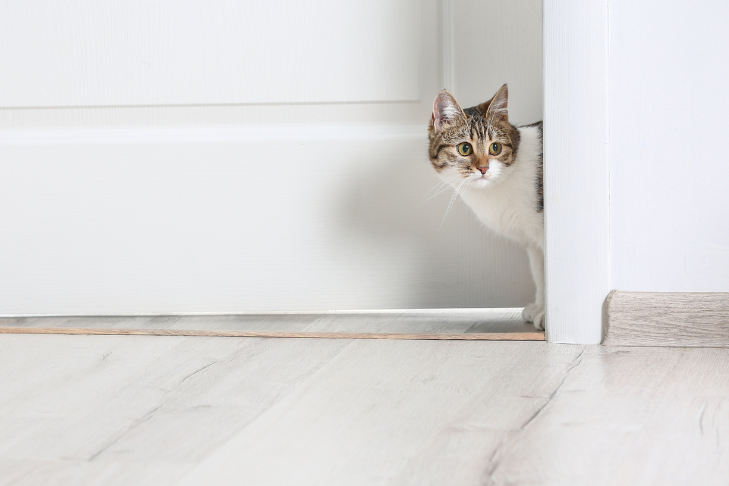Why Your Cat Is Scared of the Doorbell (and How to Help Calm Them)

If you’ve ever noticed your cat dart under the couch or race to another room the second the doorbell rings, you’re not alone. Cats are sensitive, observant animals who often react quickly to changes in their environment. A sudden noise like a knock or a chime can feel startling to them, and understanding why it happens can help you create a calmer space when guests arrive.
Why Cats React to the Doorbell
Cats rely on their surroundings to feel safe. Unlike dogs, who may bark or run to the door, cats are more likely to hide or freeze when something unexpected happens. The doorbell is loud, sudden, and usually followed by even more disruption, like footsteps, voices, or a door opening. For a creature that thrives on predictability, those surprises can easily set off alarm bells.
Your cat may also connect the sound with past experiences. If strangers usually follow the noise, your cat could anticipate a flood of new smells and activity that feels overwhelming. Even confident cats can become startled by the abruptness of the sound, especially if they are resting, eating, or grooming when it happens.
Signs That the Doorbell Startles Your Cat
Cats have subtle but telling ways of showing they are unsettled. Some common signs include:
- Flattened ears or wide, dilated eyes
- Running to hide in a closet or under furniture
- Low growling or meowing in protest
- A puffed-up tail or crouched body posture
- Refusing to return to normal activities until the environment feels quiet again
These behaviors are not unusual, but they do signal that the sound is making your cat uncomfortable.
Helping Your Cat Feel More Comfortable
While you may not be able to get rid of the doorbell entirely, you can make small changes that support your cat’s sense of safety. The goal is to create an environment where the noise doesn’t feel as alarming.
-
Create a safe zone: Set up a quiet room with cozy bedding, favorite toys, and fresh water where your cat can retreat when visitors arrive.
-
Add positive associations: Pair the sound of the doorbell with something enjoyable, like playtime or a treat, so over time it feels less threatening.
-
Keep introductions slow: If guests are coming inside, allow your cat to decide whether they want to approach. Forcing interaction can increase stress.
-
Lower the volume: If possible, adjust the sound of your doorbell or switch to a softer chime that is less jarring.
- Provide Daily Calming Support: A consistent routine can make unexpected noises feel less startling for your cat. Just like maintaining regular feeding times, try offering calming supplements that support relaxation and balance, like Pet Releaf’s Feline Stress Releaf Oil, formulated specifically for cats.

Building Confidence Over Time
Helping your cat feel calm during moments like the doorbell ringing takes patience and consistency. Small, repeated experiences that end on a positive note teach your cat that sudden sounds don’t always lead to something scary. Keep routines predictable, offer gentle reassurance, and celebrate small progress along the way. With time, many cats learn that the doorbell isn’t a threat but simply another sound in their home environment.
When Patience Pays Off
Helping your cat feel calm around sudden noises takes time, understanding, and consistency. Each positive experience teaches your cat that unexpected sounds don’t always signal something scary. Celebrate small wins, stay calm yourself, and allow your cat to adjust at their own pace. With steady reassurance, many cats learn to feel more confident when the doorbell rings.
Helping Your Cat Feel Safe Every Day
Supporting your cat’s emotional well-being is an ongoing process. By maintaining predictable routines, offering quiet spaces, and incorporating gentle wellness support, you can build a sense of comfort that carries into every part of their day. The more your cat learns they can rely on their environment (and on you) the more secure and relaxed they’ll feel, even when surprises pop up.


